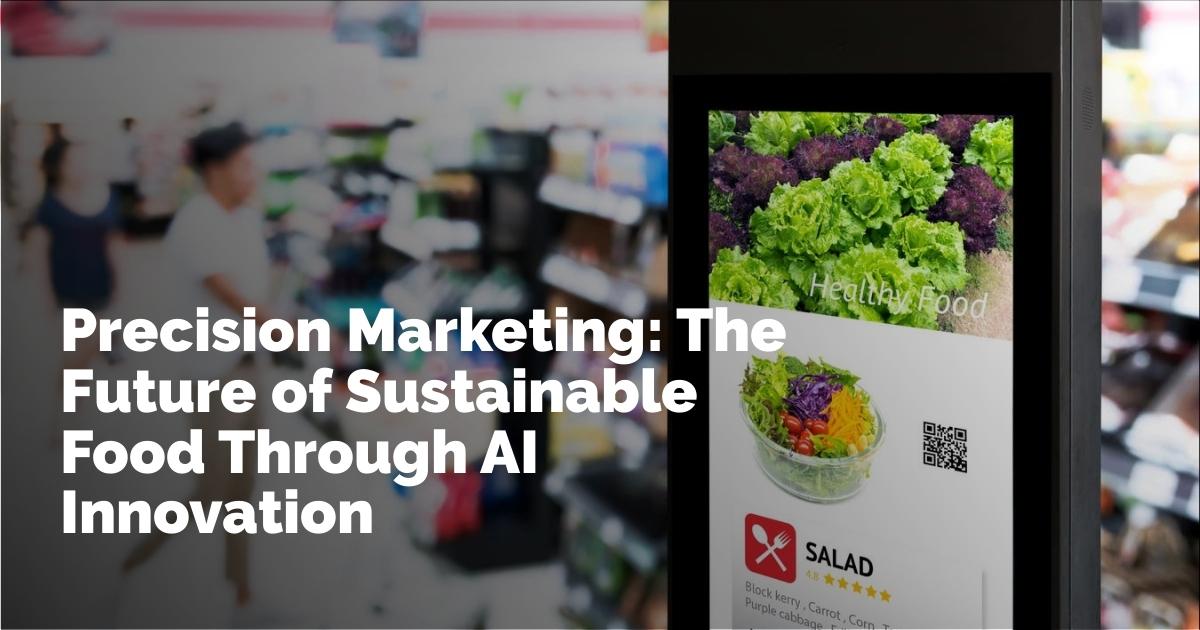AI Brings Precision To The Future Of Sustainable Food Marketing
As sustainability becomes a significant pillar of modern branding, food and consumer goods companies are increasingly turning to artificial intelligence (AI) for refining their green marketing strategies. With global investments in sustainable food and branding forecasted to soar, the digital transformation of marketing is poised to make ecological responsibility more than just a tagline. AI stands at the forefront of this shift, enabling brands to fine-tune their messaging for a more eco-conscious consumer base.
A Surge in Sustainability Spending
Forecasts suggest that by 2030, the amount spent on sustainability-focused advertising could balloon to $225 billion annually, marking a significant increase from current levels. Valentin Saitarli, CEO of AI technology firm PRAI Inc., anticipates that brands will allocate between 10% and 15% of their marketing budgets specifically for sustainability-related messaging. With rapid growth in global advertising expenditure and stricter regulatory frameworks, companies are compelled to communicate their green credentials not just for compliance, but to build deeper relationships with consumers who prioritize environmental ethics.
The race to establish sustainable market presence is no longer confined to niche sectors; giants like multinational food companies and emerging plant-based startups are equally invested. In a world where sustainability equates to quality and ethics, it is a crucial avenue for capturing brand loyalty.
The Role of AI in Targeted Messaging
In this marketing metamorphosis, AI platforms like Tastewise are game-changers. They offer brands the ability to analyze consumer preferences by sifting through vast datasets drawn from social media, online reviews, and product feedback. This technology identifies real-time trends, teaching brands to move beyond nebulous sustainability slogans to crafted messages that are tailored for specific consumer segments.
Saitarli points out that new regulatory frameworks from entities like the EU Green Claims Directive and evolving ESG disclosure rules in the U.S. are powerful drivers in this shift. Brands are not only encouraged but often required to increase transparency in their operations, a demand that AI can help meet by producing precise sustainability messages that underscore honesty and encourage consumer trust.
Consumers Demand Transparency
Today's consumers, particularly Millennials and Gen Z, are deeply invested in environmental responsibility. Survey results from L.E.K. Consulting reveal that 93% of consumers globally consider sustainability vital to their personal values. Despite being a recent increase, the commitment is clear as transparency becomes a crucial factor: more than 85% of U.S. consumers value environmental impact over manufacturing processes or product traceability according to Tastewise.
For marketers, this transparency demand is both a challenge and an opportunity. Brands are actively rethinking how to assure consumers of their sustainable practices, where factual clarity and responsive authenticity are paramount. The days of vague claims about being environmentally friendly are over; consumers want actionable insights and honest narratives that can back the claims.
Sustainable Food Storytelling and Experiences
Another evolving dimension is the intersection of AI insights with human storytelling. Research from Deloitte asserts that coalescing these elements boosts trust and engagement by up to 50%. Saitarli emphasizes that storytelling, enriched by credible data, is a winning strategy for leveraging consumer interests.
By using AI-generated insights to deliver engaging narratives, brands can craft powerful campaigns. Emotionally charged storytelling can considerably enhance engagement with sustainable products. For instance, social media initiatives addressing issues such as child labor and deforestation in the chocolate industry have demonstrated consumers’ increased willingness to support sustainable production with a premium.
Companies are now integrating generative AI to create immersive experiences like videos and virtual content that emphasize sustainability. Take PepsiCo's Oscar Sort initiative as an example. It turns recycling into a dynamic, gamified experience—reinforcing the company's commitment to sustainability and subtly advertising its values at the moment of product disposal.
AI-Driven Success in Consumer Goods
In sectors like consumer packaged goods and retail, sustainability-marketed products already constitute a large portion of growth, with expectations for these to capture up to 30% of all green branding expenditures by 2030. Giants such as Unilever and Nestlé are leveraging AI for targeting sustainability campaigns, reaping rewards in both market share and consumer trust. Unilever's U-Studio, for instance, uses AI for more efficient and impactful purpose-driven content, aligning marketing strategies with their broader goals of social responsibility and environmental sustainability.
Precision through AI doesn’t only mean targeting the right audience, but also personalizing messages that resonate with their values. Whether promoting regenerative agriculture or emphasizing plastic-free initiatives, AI equips brands with the capability of segmenting audiences based on a multitude of factors, ensuring that messages are relevant and trustworthy.
The Risk of Greenwashing
However, as companies ramp up green marketing, the threat of greenwashing looms large—where businesses might exaggerate or fabricate claims of their environmental efforts. AI's ability to process and verify data can help mitigate these risks by ensuring that sustainability claims are grounded in reality. Despite this, AI must be balanced with human oversight to avoid inadvertently supporting false narratives.
The Kantar Sustainability Sector Index highlights that while many consumers believe companies should address social and environmental issues, a significant number have encountered misleading information about brands' sustainability initiatives. This underscores the importance of ethical AI operations, where human judgment complements data-driven insights.
Efforts to counteract these pitfalls involve instituting stronger ethical frameworks in AI practices, embedding audit measures, and incorporating third-party verifications to maintain the integrity of sustainability messaging.
The Path Forward
As AI continues to revolutionize sustainable food marketing, companies that harmonize advanced analytics with authentic human input are poised to excel. They can build enduring loyalty among eco-conscious consumers by remaining transparent and upholding ethical standards.
The future of sustainable branding lies in the integration of technology and genuine human engagement. With ever-increasing scrutiny and sophisticated consumer expectations, brands are challenged to innovate with AI not only for efficiency but as a collaborative partner in shaping a more sustainable and ethically aware marketplace.
출처 : Original Source

